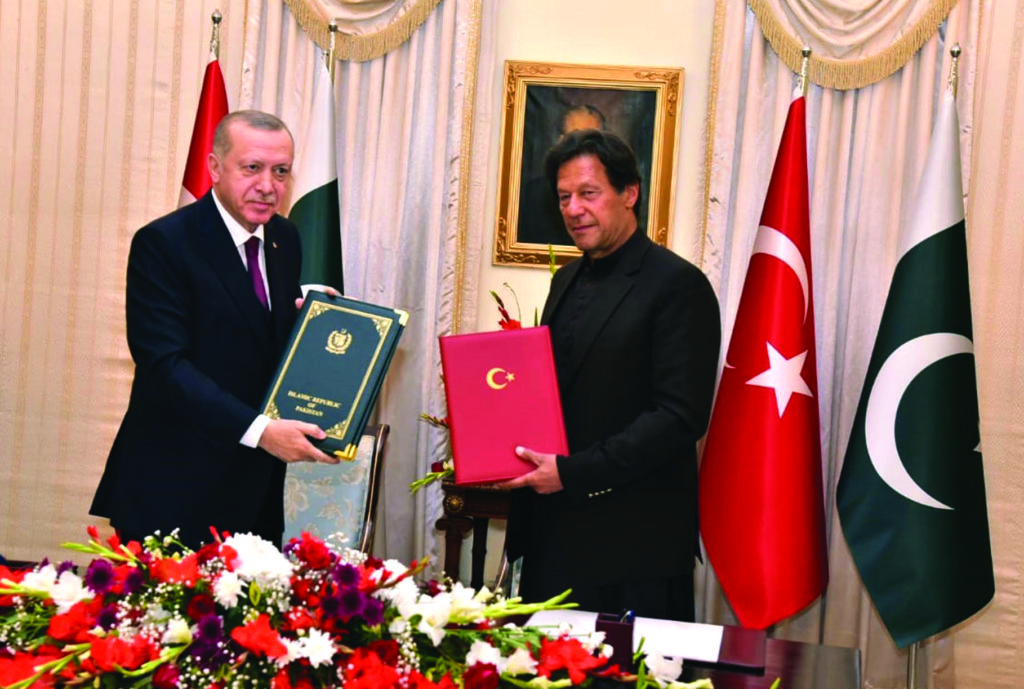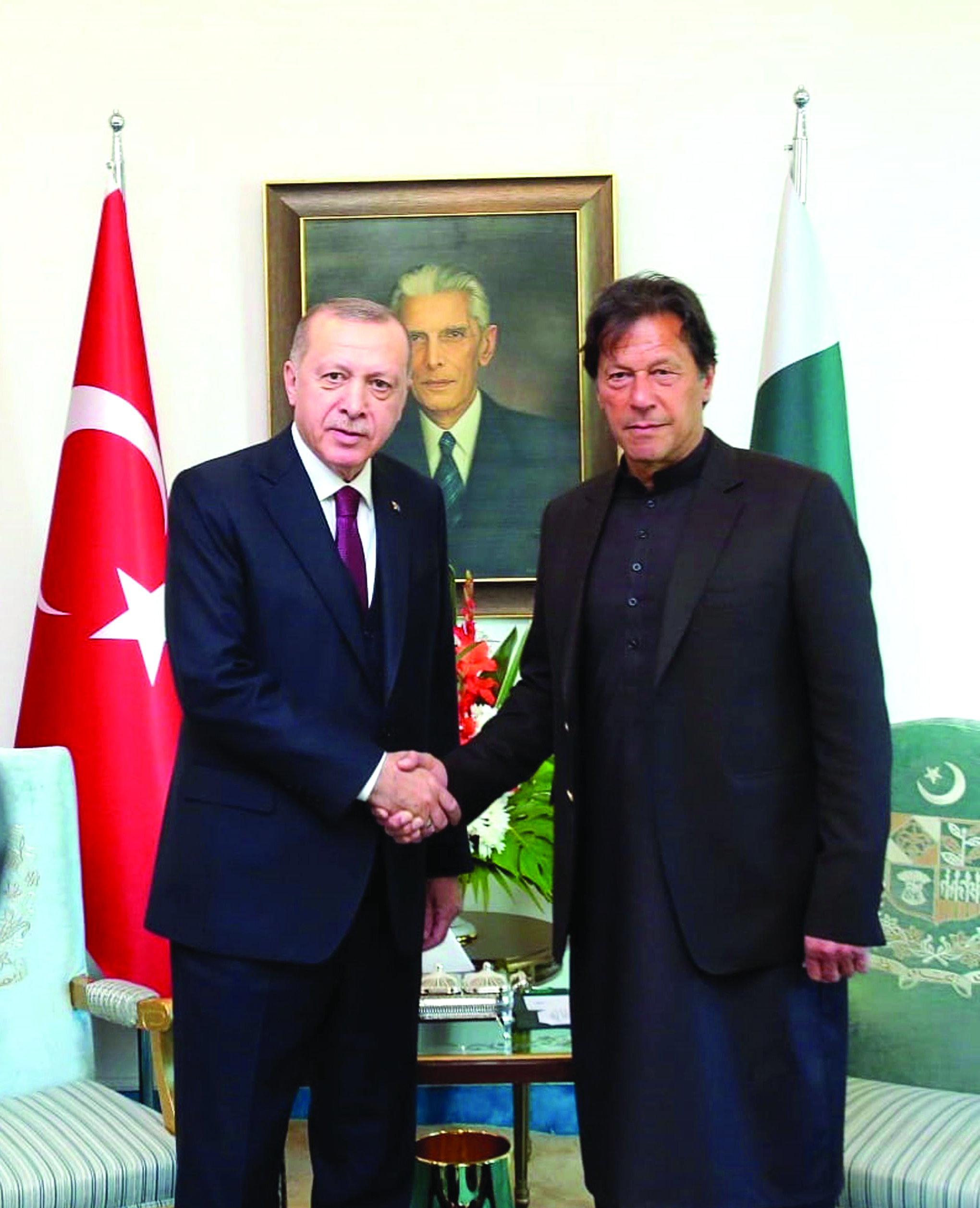“I consider Pakistan my second home; Turkey stands with Pakistan and will continue to do so”, said Turkish President and strongman Recep Tayyip Erdogan to a beaming audience of dignitaries and the press in Islamabad during a 2 day visit by the Turkish head of state to Pakistan, his seventh since gaining power in 2003. The unique friendship shared between Pakistan and Turkey dates back to a century ago, during the latter years of the First World War when the Muslims of the sub continent sent sizeable donations of gold jewelry and valuables to a republic seeking to emerge from the shambles of the then crumbling Ottoman Empire. Indeed, it is an act still revered by the Turkish nation which fondly recalls the assistance by pointing to bracelets and necklaces and expressing gratitude when they come across Pakistani tourists and expats in their country. This trend of tourism has seen a twenty fold increase in the past five years alone, as Pakistani tourists have begun to choose Turkey as a top destination for their foreign travels and cooperation at different government levels has increased dramatically. An example of this cooperation is the famed Metrobus project of Lahore, which saw extensive planning and execution assistance as well as financial assistance from the Istanbul Municipality. Turkish companies have invested in public transportation through taxi services in Lahore and Islamabad, and Turkish restaurants have also cropped up across major cities like Islamabad, Karachi, and Lahore during this time. It seems like the relationship between Turkey and Pakistan has never been better, and now with talks of a dual citizenship acceptance agreement between the countries, many rightfully wonder what the impacts of this deepening relationship will be, and what new avenues and prospects this could create for people from both countries.
The dual citizenship agreement, as some refer to it, is currently under discussion between the two countries and is currently being considered by the Ministry of Interior for finalization before it can be recommended for adoption. Many questions have arisen from the general public about this agreement, partly due to a misrepresentation of this agreement in the mass media as well as confusion caused by guesswork on online blogs and social media. A dual citizenship agreement would mean that Pakistani citizens who wished to gain Turkish citizenship (through residence, marriage, or through investment in real estate), or who possessed citizenship’s of both countries, could declare their status and legally be allowed to carry both passports simultaneously. Turkey has no restrictions on its citizens having other citizenship’s, but Pakistan restricts its citizens based on its bilateral agreements with countries on this matter. Pakistan currently has a dual nationality agreement with only 19 countries, and Turkey is not in the list. Pakistani citizens who have acquired Turkish citizenship, and vice versa, therefore use their foreign passports with their NI-COP to enter and exit Pakistan as keeping both passports simultaneously is not currently permitted. If this agreement is signed, citizens of both countries will be able to use both passports simultaneously. It should be noted here that many countries with high population of Pakistani origin citizens, including Germany, Spain, and Norway, also don’t have dual nationality agreements with Pakistan and there citizens too travel using either their NI-COP or through tourist visas applied for at foreign missions of Pakistan.

The impacts, however, of this agreement go much further than adding legal clarity to the dual citizenship issue. It follows a trend of overtures by the Turkish government in recent years to deepen the bond between Pakistan and Turkey. Former President General (R) Parvez Musharraf spent a portion of his childhood in Ankara, where his father worked at the Pakistani Embassy, and a free trade agreement proposal that begun negotiation during his time was almost finalized a few years ago in 2018 till concerns over its impact on the Turkish textile industry caused a last-minute fall through in the FTA being signed. During recent years alone, there have been very encouraging signs of improving relations. Pakistani citizens holding visas from the US, UK, and Schengen Countries are eligible for Turkish e Visa and e-Visa on arrival facility, and Turkish citizens seeking to visit Pakistan can apply for Electronic Travel Authorization and visa-on-arrival facility to make travel much easier between the two countries. Turkish Airlines, which is a major diplomacy tool that is often used by the Turkish government, has increased flights to large Pakistani cities and currently sees a daily flight between its hub in Istanbul and Karachi, Islamabad, and Lahore. During summer, an additional daily flight is added to Karachi, and Turkish Airlines has become the preferential airline for Overseas Pakistanis coming to Pakistan from Western countries due to accessibility, convenience, affordable prices, and halal meals on the flight being prime reasons. Investment by Turkish companies in Pakistan is on the rise with Arçelik buying Dawlance, and Turkish dairy giant Sütaş making an entry into the Pakistani market soon. That being said, investment by Pakistanis in Turkey is also at its highest levels. More and more Pakistanis are seeking to invest in property in Turkey to gain fast track citizenship and access to the comparatively stronger Turkish passport, as well as setting up businesses in Turkey to take advantage of its membership of the European Customs Union and its eligibility to export most goods customs free into the European Union. A similar language and culture, as well as mutual respect between the two countries makes it easier for Pakistani-owned business to quickly acclimate to the Turkish business environment, and an increasing number of Pakistanis are seeking to take full advantage of the new possibilities that this is creating.
As a part of Turkey’s 2023 vision for the 100th anniversary of the Turkish Republic, President Erdogan has promised to focus on increasing the bilateral trade between Turkey and Pakistan. There is already extensive cooperation in the fields of defense training and equipment, textile sector, as well as in the non-perishable food items sector. Turkey’s consumer goods including white goods have entered the Pakistani market and Pakistan best-selling pamper brand is also Turkish. Pakistan too has an opportunity to capitalize on this by seeking to export agricultural produce as well as meat to Turkey in addition to benefiting from the influx of technology and best practices from what is essentially a European country. Citizens of both countries can also benefit from the ease of investment in both countries; Pakistanis are amongst a few countries that currently have absolutely no restrictions on property purchases in Turkey to further show the bond of trust between the people of the two countries. It is a given that those who seek to gain a strong foothold in Turkey at an early stage will benefit from the long-term cooperation between the two countries. An area of great economic importance which is often overlooked is the cooperation on education. Turkish universities occupy spaces on the HEC’s list of approved universities for sponsored PhD candidates to study and research at and has proved to be a cost-effective alternative to more expensive European destinations for students studying on government scholarships. More and more middle-class Pakistanis are choosing Turkey as an affordable destination for higher education at private universities as the rupee depreciates and the cost of attendance at universities across the world rises. Turkish private schools have provided a high-quality education in the shape of the Pak Turk schools set up across the country which are now run by the government-supported Maarif Foundation and employ Turkish teachers, and thousands of Pakistani students are given Turkish government scholarships every year to seek higher education at state universities across the country. This is further evidenced by those students staying back in Turkey and helping to feed the rapid economic growth in the country as well as the government’s desire to further increase the rate of population growth to tackle a Europe-wide trend of population decline over the next few decades. Due the natural advantage of Pakistanis when it comes to the English language, many Turkish companies now employ Pakistanis across the country especially in their export departments, and the Turkish national cricket team is comprised mostly of Pakistanis as well.
While it remains to be seen what this latest visits and the 13 MoU’s signed between the two countries will result in, one thing is sure: Imran Khan and Recep Tayyip Erdogan have found a friend in each other, and appreciate each other’s honesty and commitment towards their country and motherland. Turkey is set to join CPEC and talks of further cooperation in the field of defense are under way. The FTA is still on the table, and with this new dual nationality agreement and the countless affluent Pakistanis choosing to acquire Turkish citizenship, the dynamics of the relations between the two countries are sure to develop and mature further. Cooperation can and should be encouraged in the fields of tackling domestic insurgencies, countering foreign threats, and strengthening economic independence. There is a lot that both countries can gain by preserving this friendship and supporting each other at international forums; truly Turkey has been an ally both when it comes to the FATF, as well as on the issue of Kashmir about which President Erdogan has historically been vocal even in the face of economic costs and souring ties with Modi’s India. President Erdogan has shown that he can prove to be a friend-in-need and a friend-indeed for Pakistan, and it is time for Pakistan to affirm the same from its end.





